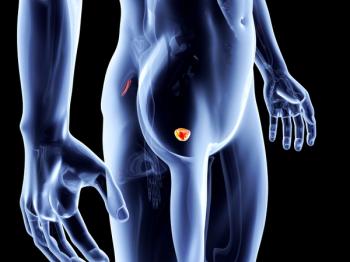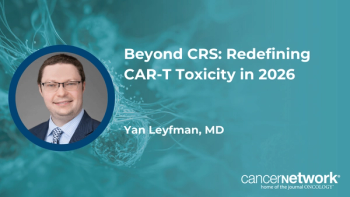
Higher Starting Dose of Lenvatinib May Improve HR-QoL Among Patients with RCC
“Based on these findings, patients who received lenvatinib 18 mg starting dose had better quality of life and less severe symptoms than those who received lenvatinib 14 mg starting dose,” said Cristiane Decat Bergerot, PhD, MS, BS.
According to a poster presented at the 2021 American Society of Clinical Oncology Genitourinary Cancers Symposium, a higher starting dose of lenvatinib (Lenvima) improved health-related quality of life and led to longer time to deterioration compared with a lower starting dose of lenvatinib in patients with renal cell carcinoma (RCC).
“Based on these findings, patients who received lenvatinib 18 mg starting dose had better quality of life and less severe symptoms than those who received lenvatinib 14 mg starting dose,” said Cristiane Decat Bergerot, PhD, MS, BS, a postdoctoral fellow at City of Hope National Medical Center in Duarte, California, during the virtual poster presentation. “In addition, participants who received lenvatinib 18 mg maintained quality of life and symptom control for longer than those who received lenvatinib 14 mg starting dose.”
In this phase 2, randomized, open-label trial, researchers compared the safety and efficacy of 2 different starting doses of lenvatinib — 18 mg per day (n = 172; median age, 61 years; 77% men) or 14 mg per day (n = 171; median age, 62 years; 75% men) — in patients with RCC who had previously received 1 vascular endothelial growth factor-targeted treatment. Both starting doses of lenvatinib were given in combination with 5 mg of everolimus per day. Patients received treatment until unacceptable toxicity, disease progression, withdrawal of consent or the end of the study.
Researchers used 3 different instruments to measure health-related quality of life: Functional Assessment of Cancer Therapy-Kidney Symptom Index Disease-Related Symptoms (FKSI-DRS), EQ-5D-3L and the European Organization for Research and Treatment of Cancer Quality of Life Questionnaire (EORTC QLQ-C30). Quality-of-life scores were measured at baseline, first day of the first cycle of treatment, and at the end-of-treatment visit.
Average quality-of-life scores in patients assigned the 18 mg dose were higher compared with those assigned the 14 mg dose. In addition, the higher dose group had lower symptom severity compared with the lower dose group.
“Mean differences in favor of lenvatinib 18 mg were seen in most scales,” said Bergerot during the presentation. “However, none of these differences exceeded the minimally important difference for clinical significance.”
The median time to first deterioration was longer in patients assigned the 18 mg starting dose compared with those assigned the 14 mg starting dose in most scales including the FKSI-DRS total score (HR = 1.3; 12 weeks vs 15.71 weeks). This was also observed for EORTC QLQ-C30, which assessed emotional functioning (20.71 weeks vs 34.86 weeks), social functioning (12.14 weeks vs 16.29 weeks), dyspnea (20.29 weeks vs 40.29 weeks), insomnia (15.43 weeks vs 28.14 weeks), and financial difficulties (36.14 weeks vs not estimable).
Patients assigned the 18 mg starting dose also had a longer time to definitive deterioration based on the FKSI-DRS total score (HR = 1.46; 56.43 weeks vs 80.14 weeks). This was also observed for EORTC QLQ-C30 scores, which assessed factors such as physical functioning (HR = 1.65; 56.14 weeks vs 99.57 weeks), cognitive functioning (HR = 1.44; 56.14 weeks vs 72.29 weeks), and fatigue (HR = 1.59; 40.14 weeks vs 72.29 weeks).
“In conclusion, these findings support the approved treatment of lenvatinib 18 mg starting dose in combination with everolimus as an effective treatment option for patients with renal cell carcinoma following one prior VEGF-targeted treatment while maintaining quality of life,” said Bergerot during the presentation.
Reference:
Bergerot CD, Rha SY, Pal SK, et al. Health-related quality-of-life outcomes from a phase II open-label trial of two different starting doses of lenvatinib in combination with everolimus for treatment of renal cell carcinoma following one prior VEGF-targeted treatment. Presented at: 2021 American Society of Clinical Oncology Genitourinary Cancers Symposium; February 11-13, 2021; virtual. Abstract 314.
Newsletter
Stay up to date on recent advances in the multidisciplinary approach to cancer.













































